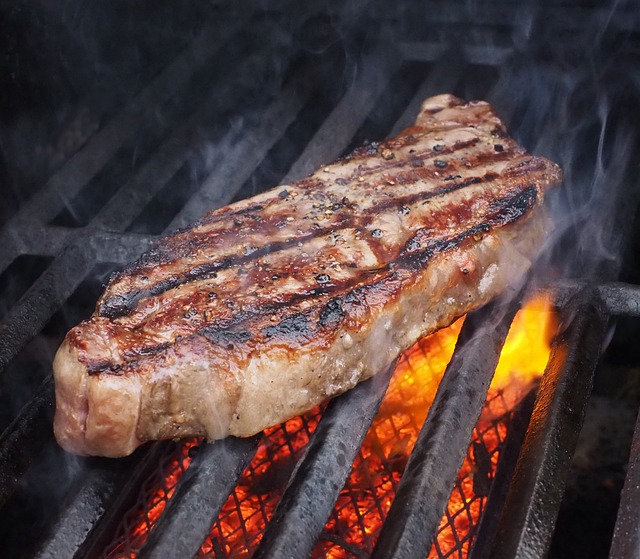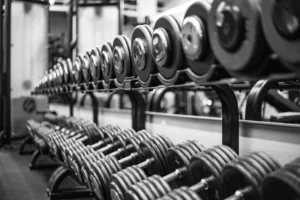
When people hear the word protein, they usually think of something relating to muscles. I know tons of people who take protein shakes multiple times a day in the belief that “the more protein, the better” and feel like the only way they can grow huge muscles is to take in as much protein as is humanly possible. My aunt, who is very active and probably weighs no more than 130 pounds, takes protein shakes every day because she thinks she needs them and they are healthy.
I have spoken to numerous friends at the gym, and they said, “Hey man, if you want to get really big, you have to take protein shakes 3 or 4 times a day,” or “when you lift, you need more protein, so take amino acid supplements and protein shakes.” I remember my cousin years ago trying to sell me these monster pills he had that were supposed to help build muscle called “animal pack,” or something like that. With a name like that, how could I pass it up??
I believe the bodybuilding industry is to blame for our society’s obsession with protein, as they make a lot of money from protein powders and supplements that they make. How much protein is too much? This is a topic almost never talked about in the bodybuilding circuit or even on the news.
How scientists come up with protein requirements
Our body is capable of recycling and reusing amino acids. This process is not perfect, and there are still appreciable losses of amino acids all the time. Because of this, we need to constantly supply our bodies with new sources of amino acids. All you need to know about amino acids is that they are the building blocks of protein. Every protein is made of amino acids. When we eat, our body breaks the protein into its amino acids.
Scientists use nitrogen balance studies to determine our protein needs. Nitrogen was chosen because nitrogen is contained mainly in proteins, and scientists can measure nitrogen balance by finding the net difference between the intake and absorption of nitrogen from the diet and the amount excreted in urine and feces (1). This system does allow scientists to measure how much nitrogen, and hence protein, is required each day in order to produce nitrogen balance, but it is not without controversy.
Nitrogen balance studies have many problems. They are not very accurate, and there is much debate as to their utility. One common criticism is that this method overestimates nitrogen intake and underestimates nitrogen losses because it does not account for nitrogen lost through the skin as urea and released in the air as ammonia (1). The method is far from perfect, but its problems are outside the scope of this report.
The effects of weight training on protein requirements
Contrary to popular belief, the body adapts as it gets used to regular resistance training exercises and may require less protein after training to support maximal protein synthesis (2). Resistance exercise stimulates both protein synthesis and protein breakdown (2). Studies have shown that post-workout, muscle proteins (myofibrils) are resistant to being broken down, and it is likely that non-muscle proteins are the ones being broken down to release their amino acids (2).
Nearly every study that measured muscle protein balance after resistance exercise has found an extremely elevated protein synthesis but negative muscle balance until we orally take in amino acids, which seem to go directly to the muscles and stimulate muscle protein synthesis (2). It was also found that the delivery of amino acids to the muscles stimulates muscle protein synthesis only up to a certain point, above which additional amino acids would be converted to urea (2). Once this protein ceiling is reached, there would be no benefit to taking, say, 80 grams post-workout if 40 grams would do the trick.
One study found no difference in positive net protein balance whether 6 grams of amino acids were taken 1 hour or 3 hours after working out (3). Intake of pre-workout protein, however, was found to enhance muscle protein balance, which in theory would result in long-term improved gains in muscle protein mass from resistance exercise (3).
Another study showed that resistance training exercise stimulated muscle protein synthesis at 24 and even 48 hours following exercise, even with no food intake (4). This means that the building of muscles happens over a long period of time even without proper protein intake, so focus on eating properly the days following a workout and not just on the immediate post-workout protein intake.
Protein requirements for active people
Whether or not bodybuilders and powerlifters require more protein than sedentary people is an area of much debate, with no agreement reached in the scientific literature. In the early stages of strength training, where muscle mass is rapidly increasing, it is pretty much agreed upon that this is a time where a positive protein balance is needed, so they would need more protein than sedentary people (2). The debate begins when talking about whether or not powerlifters would still need additional protein once their muscle mass is high but stable (2).
Different studies have produced drastically different protein requirements for athletes. Compared to the protein recommendation for sedentary people, one study found that the protein needs of bodybuilders were only 12% higher; another study found that American football players required double the amount of protein; and another study found that resistance training improved the body’s use of amino acids and nitrogen, so higher protein intakes were not needed (5, 6, 7). Finally, a study looking at the early stages of intensive bodybuilding training showed that protein needs were double the recommended amount but that increasing protein intake from 1.35 to 2.62 grams per kg body weight per day did not result in better mass or strength gains (8).
When looking at nitrogen balance data for those who exercise regularly, it was found that to achieve zero nitrogen balance, these athletes required about 1.33 grams per kg of body weight, or 66% greater than current protein recommendations (2). For a 200-pound man, that would equal 121 grams of protein per day. How often someone trains, how conditioned they are, and how hard they exert themselves can all influence their protein needs.
If you want to use your overall calories to determine protein needs, the Dietary Guidelines recommend that 10–35% of your calories come from protein. A proven adequate protein level for active people is around 15–25% of total calories. For someone consuming a 2,500-calorie diet, this would be between 94 and 125 grams of protein per day, which is easily reached without supplements.
Other factors affecting protein requirements
Closely linked to nitrogen balance is overall energy (caloric) intake. Even with a very high intake of protein, there cannot be a positive nitrogen balance until the energy balance is positive (2). Surprisingly, it was found that exercise was able to increase nitrogen balance even during periods of insufficient energy balance (2). This is important for bodybuilders trying to cut weight for a competition who decrease their caloric intake to deficient levels. If they exercise during this period, they may be able to slow, if not stop, the loss of lean body mass (2). Increasing their protein intake during this period to 27% of their caloric intake can also help prevent the loss of lean body mass (2). When cutting weight, you should not replace carbohydrates with fats, as carbohydrates are needed to keep muscle glycogen somewhat high (for performance) and to support protein retention (2).
Speaking of carbohydrates, this is a macronutrient that is essential to fueling physically active people. Carbohydrates are needed for intense muscle contractions, and the body much prefers to use carbohydrates over fat and protein (9). Although we are able to store carbohydrates as glycogen, an intense exercise bout can actually deplete nearly all of our stores, which means that they need to be replaced (9). If carbohydrate stores are too low, the body begins to breakdown protein during exercise (9). Athletes typically have a difficult time replenishing their carbohydrate stores after exercise, so eat up!
The fate of excess protein
Unlike carbohydrates and lipids, which we are able to store long-term as glycogen and fat, excessive dietary protein must be converted into fuel (glucose) or ketones. After protein breakdown, its amino acids enter the bloodstream, and the excess nitrogen from the excess amounts is converted to ammonia, which is then converted to urea by the liver and lost in urine. High protein intake can cause calcium loss in urine, cause dehydration as water is needed to break down amino acids and release nitrogen, and increase your risk of getting kidney stones by 250 percent. Protein can also be stored as fat, but converting it to fat requires a lot of work, and our body likes to take the path of least resistance, so it would rather choose dietary fat to store since no conversion is necessary.
Discussion
The RDA sets a protein intake for everyone over 19 years of age at 0.8 g protein per kg of body weight. This would be 72 grams of protein per day for a 200-pound man. This is assuming he is not physically active. Looking at all of the data, I would say that an adequate protein intake for physically active people would be 1.33 grams of protein per kg of body weight each day. I agree that beginning bodybuilders who are actively putting on muscle mass may require more than 1.33 grams of protein per kg of body weight. I tend to side with the researchers that say once we have achieved our optimal muscle mass, protein needs level out as we are supporting the muscle mass and not actively building new cells, at least not at the rate of beginning lifters.
Think of a house being built. When you start building it, you need all different types of wood and lots of it (amino acids) to build the house (muscle). After being built, you just need to maintain the structure. With excess stress on the house like wind, rain, etc. (tearing and stretching muscle cells), you will need to replace pieces of wood (amino acids) here and there, but the basic foundation is laid, and you do not require as much wood (amino acids) as you did when building the house. Well, that’s the idea, at least.
Studies have shown that bodybuilders typically take in protein amounts in excess of even the most liberal recommendations. With a balanced diet, bodybuilders normally do not need protein supplements. The bodybuilding industry really pushes the idea of eating high amounts of protein with each meal, but once you get all your body can use, you are just wasting your money and peeing out the excess protein. Plus, you can get kidney stones, lose calcium, and cause yourself to be dehydrated.
Sources
1. Tessari, P. (2006). Nitrogen balance and protein requirements: definition and measurements. In Cachexia and Wasting: A Modern Approach (pp. 73-79). Springer Milan.
2. Phillips, S. M. (2004). Protein Requirements And Supplementation In Strength Sports. Nutrition, 20(7-8), 689-695.
3. An oral essential amino acid-carbohydrate supplement enhances muscle protein anabolism after resistance exerciseBlake B. Rasmussen, Kevin D. Tipton, Sharon L. Miller, Steven E. Wolf, Robert R. Wolfe ; Journal of Applied PhysiologyFeb 2000,88(2)386-392
4. Phillips, S. M., Tipton, K. D., Aarsland, A. S. L. E., Wolf, S. E., & Wolfe, R. R. (1997). Mixed muscle protein synthesis and breakdown after resistance exercise in humans. American Journal of Physiology-Endocrinology And Metabolism, 36(1), E99.
5. Tarnopolsky, M. A., MacDougall, J. D., & Atkinson, S. A. (1988). Influence of protein intake and training status on nitrogen balance and lean body mass. J ApplPhysiol, 64(1), 187-93.
6. Phillips, S., &Shwarcz, H. P. (1992). Evaluation of protein requirements for trained strength athletes. J ApplPhysiol, 73, 1986-1995.
7. Campbell, W. W., Trappe, T. A., Jozsi, A. C., Kruskall, L. J., Wolfe, R. R., & Evans, W. J. (2002). Dietary protein adequacy and lower body versus whole body resistive training in older humans. The Journal of physiology, 542(2), 631-642.
8. ATKINSON, S. A. (1992). Protein requirements and muscle mass/strength changes during intensive training in novice bodybuilders. J. Appl. Physiol, 73(2), 767-775.
9. Lemon, P. W. (2000). Beyond the zone: protein needs of active individuals. Journal of the American College of Nutrition, 19(sup5), 513S-521S.




En este articulo que hablar de las proteinas me parecio muy lindo ye interesante porque me aclaro varios puntos de que requiere mas proteinas una persona activa que una sedentaria, para quienes quieren mas musculos grandes y firmes.
Gracias! Alguien como tu necesitas un poco proteina cada dia. Si tu quieres musculos grandes necesitarias mucho proteina pero creo que tu no quieres musculos grandes!
I understood how amino acids work with the proteins when you gave the house example. Keep it up! I really like reading your articles. I thought I have knowledge about the topics you write about, but I am learning a lot with your blog.
I just want to share with you that one time I saw what bodybuilders eat for breakfast. It was a lot of protein. They had like 2 or 3 chicken breasts, a whole plate of several boiled eggs, and food I don’t remembered. They had a tray full of food. It was kind of unpleasant to see that.
haha funny story. Some bodybuilders get carried away with protein intake. Most of them that consume huge amounts of protein sacrifice carbohydrates which as a previous blog mentioned are needed to build and maintain muscle. Plus we can only handle and digest a small amount of protein at a time so eating that many eggs and chicken breasts would be a waste of money!
Really interesting to learn about how much the amount of proteins help in your muscle building.
Thanks! Yeah I really didn’t know how much protein we needed if we worked out either. Honestly though it would be hard not to get enough protein especially if you eat meat. In fact most people get too much protein, at least in the United States
I was wondering if it’s true that the older you get the harder it is to lose weight. I just had baby number 5 three months ago and I’m 35 years old. I used to be obsessed with running and usually bounced back with in 6 months of having a baby, not this time. I do cardio but not like I used to but I feel I’m not seeing results as fast as I would want. Should I continue doing cardio to lose weight and then after I drop pounds start throwing in weight training into the mix or should I do both weights and cardio now?
Yeah our metabolism definitely slows down as we age. The older we get the less calories we require. Even so, 35 isn’t really old. It is healthier to lose weight slowly and it will last longer. Don’t get discouraged if you do not lose weight as quickly as you have in the past. Losing 1-2 pounds a week is great you just need to be patient. And you should do weights and cardio at the same time so you develop and maintain muscle while running otherwise you may end up running off any muscle you have and end up with a distance runners build which is skinny but no muscle tone at all.
The major problem is that you need to have a calorie EXCESS in order to put on muscle so trying to cut your calories down while adding new muscle is extremely difficult. If you are just worried about losing weight than just run and eat healthy. When you don’t mind putting on a few pounds start lifting weights again. You will get more toned but of course you won’t just put on muscle you will also put on fat too so you need to do it slowly to limit the amount of weight you put on.
So to answer your question just stick with cardio and eat healthy. When you lose all the weight you want continue with cardio (for cardiovascular health) and start lifting weights to get toned : )
Great info. I like how thorough your articles are and how you make an effort to explain how the body works instead of just giving reccomendations without explanation. It makes it easier to understand and remember. Good analogies too
Hey Matt. Thanks for the comment. I try to be descriptive as possible in my blogs. I don’t like giving information without explaining the reasoning. I want people to learn and become able to make their own decisions about their health. I try to be as unbiased as possible in all of my blogs. Thanks again for the comment